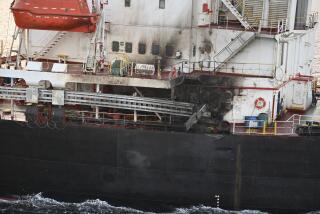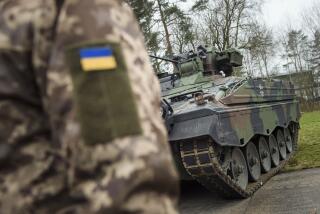German Cabinet Wants to Send Jets, Troops to Bosnia : Balkans: Bundestag must vote on nation’s first foreign-combat role since Nazis’ defeat in 1945.
- Share via
BERLIN — Chancellor Helmut Kohl’s Cabinet agreed Monday to send German attack aircraft and about 1,500 military personnel to support the U.N. peacekeeping mission in Bosnia-Herzegovina, setting the stage for an emotional parliamentary debate about Germany’s role in the post-Cold War world.
Deployment of the Tornado aircraft is sensitive here because it would mark the German military’s first foreign-combat role since the Nazis’ defeat in 1945.
A debate in the Bundestag, or lower house of Parliament, is expected Friday.
Many delegates outside of Kohl’s Christian Democratic Union oppose any deployment of German troops outside the territory of the North Atlantic Treaty Organization on the grounds that they could escalate conflicts they were sent to defuse.
German liberals, in particular, believe that after the extensive damage that German armies caused in Europe and elsewhere in the earlier decades of this century, modern Germany has a moral obligation to keep its army on an extremely short leash.
That the destination of the soldiers and planes in this case is a former Yugoslav republic makes the operation even more sensitive in Germany. The Wehrmacht killed tens of thousands of anti-fascist Serbs and other opponents in that region during World War II, and Germans know that among the history-conscious Serbs, they are still viewed with deep suspicion.
Even German Defense Minister Volker Ruehe, who has been pushing for German involvement, said his country must stop short of ever sending ground troops into the region. “If we put ground troops into Bosnia, we would be part of the problem and not part of the solution,” he said.
*
If the deployment is approved by the Bundestag, Germany will soon begin transferring 28 aircraft to NATO bases in Italy, including eight ECR-Tornado attack jets armed with radar-jamming equipment and missiles. The Tornados, by far the most controversial part of the deployment, would be used to find and knock out Serb anti-aircraft positions.
NATO has been eager to bring the German Tornados on board because similar U.S. anti-radar planes haven’t always been available for Bosnia duty. Ruehe has stated that a German Tornado force, had it been up and running in Bosnia, might have prevented the recent downing of an American plane piloted by Capt. Scott F. O’Grady.
Other equipment to be sent to Bosnia includes transport planes, a field hospital and mobile first-aid units. Many of the military personnel to be deployed are army medics, some of whom would be stationed across the border from Bosnia in Croatia. These elements of the deployment are seen as far less controversial.
Ruehe called the German force, as conceived, a “moderate” operation in which Germans might never see combat at all, and certainly wouldn’t open fire unless they had to.
*
Despite the high domestic sensitivity of the operation, the deployment is expected to pass a Bundestag vote Friday.
The German constitution, written after World War II, sets limits on where and how the German army may legally be deployed. A ruling last year by Germany’s special court for constitutional questions said Germany could legally send its troops outside the NATO area, as long as each “out-of-area deployment” was approved in advance by the Bundestag.
More to Read
Sign up for Essential California
The most important California stories and recommendations in your inbox every morning.
You may occasionally receive promotional content from the Los Angeles Times.










